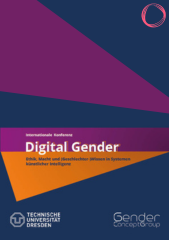‚Mehr als nur Frühstück ans Bett‘
Objektivierung vs. posthumane Kollektivverantwortung in Channel 4s "Humans"
DOI:
https://doi.org/10.17169/ogj.2024.216Schlagworte:
Feminisierung, "Humans", künstliche Intelligenz, Mutterbild, sexualisierte GewaltAbstract
Im Intro zur Channel 4-Fernsehserie „Humans“ (2015-2018) preist ein Voice-Over eine Gynoid mit den Worten an: „Dieses mechanische Hausmädchen kann mehr als nur das Frühstück ans Bett bringen“. Intro und Anfang der Serie aktivieren, so das Argument dieses Artikels, misogyne Tendenzen in der KI-Imagination, um diese sichtbar zu machen und infrage zu stellen. „Humans“ verdeutlicht, wie sexistische und, weniger prominent, rassistische Machtstrukturen in KI-Design fortgeschrieben und damit verstetigt werden. Die Serie wendet sich insbesondere der Wechselwirkung zwischen der Objektivierung von Frauen und der Feminisierung von Objekten zu. Gleichzeitig bleibt die Serie jedoch in einer binären Geschlechterkonstruktion verhaftet und unterwandert ihre eigene Kritik an Ausbeutung zum Wohle einer privilegierten Minderheit.
Literaturhinweise
Atanasoski, Neda/Vora, Kalindi (2019a): Epilogue. On Technoliberal Desire, Or, Why There Is No Such Thing as a Feminist AI. In: Atanasoski, Neda/Vora, Kalindi (Hg.): Surrogate Humanity. Race, Robots, and the Politics of Technological Futures, Perverse Modernities. Durham: Duke University Press, 188–196. doi: 10.1515/9781478004455-009
Atanasoski, Neda/Vora, Kalindi (2019b): Introduction. In: Atanasoski, Neda/Vora, Kalindi (Hg.): Surrogate Humanity. Race, Robots, and the Politics of Technological Futures, Perverse Modernities. Durham: Duke University Press, 1–26. doi: 10.1515/9781478004455-002
Belk, Russell (2022): Artificial Emotions and Love and Sex Doll Service Workers. In: Journal of Service Research 25 (4), 1–16. doi: 10.1177/10946705211063692
Benedikter, Roland/Gruber, Mirjam (2019): The Technological Retro-Revolution of Gender. In a Rising Post-Human and Post-Western World, It Is Time to Rediscuss the Politics of the Female Body. In: Loh, Janina/Coeckelbergh, Mark (Hg.): Feminist Philosophy of Technology, TTechno:Phil. Aktuelle Herausforderungen der Technikphilosophie. Berlin: J.B. Metzler. doi: 10.1007/978-3-476-04967-4_10
Braidotti, Rosi (2014): Posthumanismus. Leben jenseits des Menschen. Frankfurt am Main/New York: Campus Verlag.
Compes, Natascha (2018): Doing Gender – Doing Human. In: denkste: puppe – multidisziplinäre zeitschrift für mensch-puppen-diskurse 1 (1), 92–101. urn: https://nbn-resolving.org/urn:nbn:de:hbz:467-13212
DeFalco, Amelia (2020): Towards a Theory of Posthuman Care. Real Humans and Caring Robots. In: Body & Society 26 (3), 31–60. doi: 10.1177/1357034X20917450
Docherty, Thomas (2016): Complicity. Criticism Between Collaboration and Commitment. London/New York: Rowman & Littlefield International.
Engel, Uwe (Hg.) (2023): Robots in Care and Everyday Life. Future, Ethics, Social Acceptance. 2023. Cham: Springer Nature. doi: 10.1007/978-3-031-11447-2
Featherstone, Jane/Wax, Derek/Lundström, Lars (Produzent*innen) (2015–2018): Humans [Fernsehserie]. Channel 4, Xbox Entertainment Studios, AMC; Channel 4.
Fraser, Nancy (2016): Contradictions of Capital and Care. In: New Left Review (100), 99–117.
Freitag, Charlotte/Berners-Lee, Mike/Widdicks, Kelly/Knowles, Bran/Blair, Gordon S./Friday, Adrian (2021): The Real Climate and Transformative Impact of ICT. A Critique of Estimates, Trends, and Regulations. In: Patterns 2 (9). doi: 10.1016/j.patter.2021.100340
Garland, Alex (Regie/Drehbuch) (2014): Ex Machina [Film] A24, Universal Pictures.
Haraway, Donna Jeanne (2018): Unruhig bleiben. Die Verwandtschaft der Arten im Chthuluzän. Frankfurt am Main/New York: Campus Verlag.
Haraway, Donna Jeanne (2006): A Cyborg Manifesto. Science, Technology, and Socialist-Feminism in the Late 20th Century. In: Weiss, Joel/Nolan, Jason/Hunsinger, Jeremy/Trifonas, Peter (Hg.): International Handbook of Virtual Learning Environments. Dordrecht: Springer, 117–158. doi: 10.1007/978-1-4020-3803-7_4
Harper, Susan/Smartt Gullion, Jessica (2021): “Science Put Babies in My Belly”. Cyborg Mothering and Posthumanism in Orphan Black. In: Palko, Abigail L./O’Reilly, Andrea (Hg.): Monstrous Mothers: Troubling Tropes. Bradford, Ontario: Demeter Press, 46–61. doi: 10.2307/j.ctv1vbd22k.7
Hellstrand, Ingvil Førland/Koistinen, Aino-Kaisa/Orning, Sara Elisabeth Sellevold (2019): Real Humans? Affective Imaginaries of the Human and its Others in Swedish TV series Äkta Människor. In: Nordic Journal of Migration Research 9 (4), 515-532. doi: 10.2478/njmr-2019-0028
Islam, Najrin (2020): Her. In: Murguía, Salvador Jimenez/Dymond, Erica Joan/Fennelly, Kristina (Hg.): The Encyclopedia of Sexism in American Films, National Cinema Series. Lanham, Maryland: Rowman & Littlefield, 169–172.
Jonze, Spike (Regie, Drehbuch) (2013): Her [Film]. Annapurna Pictures.
Kurtz, Katherine (2020): Monster-as-Actor, Woman as Role. In: Compagna, Diego/Steinhart, Stefanie (Hg.): Monsters, Monstrosities, and the Monstrous in Culture and Society. Wilmington: Vernon Press, 27–48.
Langer, Paul F./Weyerer, Jan C. (2020): Diskriminierungen und Verzerrungen durch Künstliche Intelligenz. Entstehung und Wirkung im gesellschaftlichen Kontext. In: Oswald, Michael/Borucki, Isabelle (Hg.): Demokratietheorie im Zeitalter der Frühdigitalisierung. Wiesbaden: Springer VS, 219–240. doi: 10.1007/978-3-658-30997-8_11
Lundström, Lars (Produzent) Hamrell, Harald/Akin, Levan (Regie) (2012): Real Humans [Fernsehserie]. Sveriges Television.
O’Reilly, Andrea (2004): Introduction. In: O’Reilly, Andrea (Hg.): Mother Outlaws. Theories and Practices of Empowered Mothering. Toronto: Women’s Press, 1–28.
Rose, Jacqueline (2018): Mothers. An Essay on Love and Cruelty. [First American Edition]. New York: Farrar, Straus and Giroux. doi: 10.3366/pah.2019.0285
Sanders, Mark (2002): Complicities. The Intellectual and Apartheid. Philosophy and Postcoloniality. Durham: Duke University Press. doi: 10.1215/9780822384229
Simpson, Ruth/Slutskaya, Natasha/Lewis, Patricia/Höpfl, Heather (2012): Introducing Dirty Work, Concepts and Identities. In: Simpson, Ruth/Slutskaya, Natasha/Lewis, Patricia/Höpfl, Heather (Hg.): Dirty Work. Concepts and Identities, Identity Studies in the Social Sciences. Houndmills /New York: Palgrave Macmillan, 1–18. doi: 10.1057/9780230393530_1
Stadler, Jane (2017): Empathy in Film. In: Maibom, Heidi Lene (Hg.): The Routledge Handbook of Philosophy of Empathy, Routledge Handbooks in Philosophy. London/New York: Routledge, Taylor & Francis Group, 317–326. doi: 10.4324/9781315282015
Thürmer-Rohr, Christina (2008): Mittäterschaft von Frauen. Die Komplizenschaft mit der Unterdrückung. In: Becker, Ruth/Kortendiek, Beate/Budrich, Barbara (Hg.): Handbuch Frauen- und Geschlechterforschung, Geschlecht & Gesellschaft. Wiesbaden: VS Verlag für Sozialwissenschaften, 88–93. doi: 10.1007/978-3-531-91972-0_11
Tronto, Joan C. (2013): Caring Democracy. Markets, Equality, and Justice. New York: New York University Press. doi: 10.18574/nyu/9780814770450.001.0001
Wächter, Cornelia (2022): ‘Skin in the Game’. Complicity and Queer Utopianism – Coils of the Serpent. In: Coils of the Serpent (10), 153–169.
Yang, Julianne Q.M. (2018): Negotiating Privilege and Social inequality in an Alternative Sweden. Real Humans/Äkta Människor (SVT, 2012–2013). In: Journal of Aesthetics & Culture 10 (2), 1438730. doi: 10.1080/20004214.2018.1438730

Downloads
Veröffentlicht
Zitationsvorschlag
Ausgabe
Rubrik
Kategorien
Lizenz
Copyright (c) 2024 Cornelia Wächter

Dieses Werk steht unter der Lizenz Creative Commons Namensnennung 4.0 International.
Alle Beiträge in Open Gender Journal erscheinen unter der Lizenz Creative Commons Namensnennung 4.0 International (CC BY 4.0). Die entsprechenden Texte dürfen Sie unter den Bedingungen der Lizenz frei nutzen (Lizenzvertrag, allgemeinverständliche Fassung). Es findet keine exklusive Übertragung von Verwertungsrechten („copyright transfer“) an die Zeitschrift statt. Open Gender Journal stellt den Autor*innen keinerlei Kosten für die Publikation (sogenannte Article Processing Charges, APC) oder die Einreichung (sog. Submission Charges) in Rechnung. Die Autor_innen werden ermutigt, ihre Beiträge auch an anderen Orten, z.B. in Repositorien, einzustellen.












